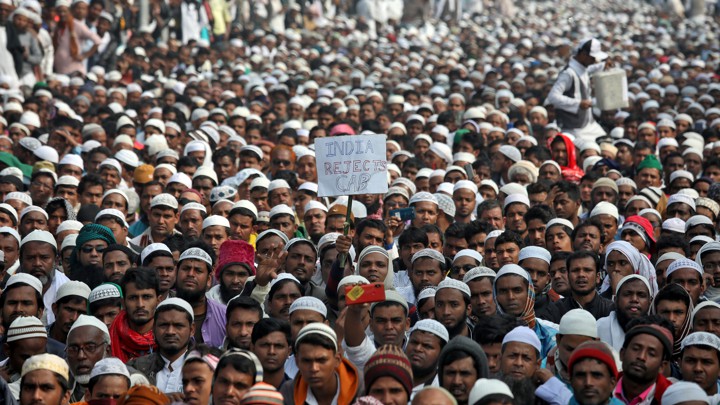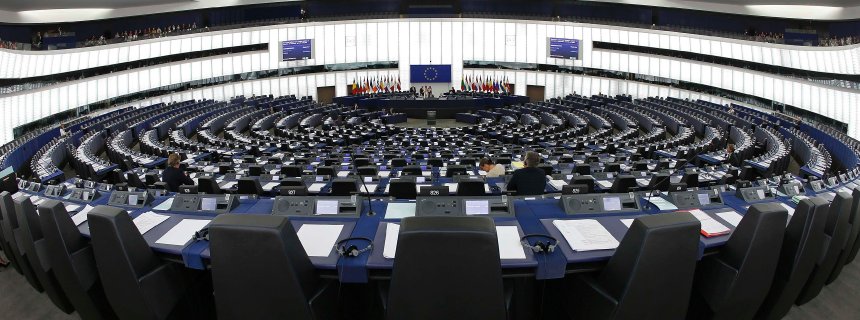154 European Union Lawmakers Draft Stunning Resolution Anti-India’s Citizenship Amendment Act
Mala Jay – National Herald [India]
25 Jan 2020 – In a scathing denouncement of CAA, the lawmakers have drafted a formal five-page resolution to be tabled during the plenary session of the European Parliament starting in Brussels next week.
India’s Citizenship Amendment Act (CAA) could trigger the “largest statelessness crisis in the world and cause widespread human suffering”, a powerful group of 154 European Parliament members have warned.
In a scathing denouncement of CAA, the lawmakers have drafted a formal five-page resolution to be tabled during the plenary session of the European Parliament starting in Brussels next week.
The proposed resolution not only describes the CAA as “discriminatory and dangerously divisive” but also a violation of India’s “international obligations” under the International Covenant on Civil and Political Rights (ICCPR) and other Human Rights treaties to which New Delhi is a signatory.
The 154 lawmakers belong to the ‘S&D Group’ – a progressive forum of MEPs from 26 EU countries, recognised as the second-largest political caucus in the European Parliament. They are committed to upholding social justice and democratic values such as Equality, Diversity and Fairness.
Significantly the draft resolution also refers pointedly to the United Nations Basic Principles on the Use of Force and Firearms by Law Enforcement Officials, to which India is also bound.
This is in the context of their observation that the adoption of the CAA “has sparked massive protests against its implementation, with 27 reported deaths, 175 injured and thousands arrested and reports that the Indian government has ordered internet shutdowns, imposed curfews and placed limits on public transportation to prevent peaceful protests”.
Moreover, “reports have emerged of hundreds of protesters being beaten, shot, and tortured, in particular in Uttar Pradesh”.
The draft resolution notes that on January 5, 2020, the campus of Jawaharlal Nehru University, where students were protesting against the CAA and the National Register of Citizens (NRC), was attacked by a masked mob that injured over 20 students and teachers from the University.
It says various media reports and students have alleged that the police stood witness to the attack and refused to control and arrest the mob, about which the international community, including the UN, has already expressed concerns regarding the CAA and the violence that it has sparked. It quotes the spokesperson for the UN High Commission for Human Rights as having expressed concern that the CAA is ‘fundamentally discriminatory in nature’.
The S&D Group has pointed out that CAA was amended ostensibly to enable irregular migrants to acquire Indian citizenship through naturalisation and registration. However the CAA restricts eligibility to only Hindus, Sikhs, Buddhists, Jains, Parsis and Christians from Afghanistan, Bangladesh and Pakistan who entered India on or before 31 December 2014. “The CAA is explicitly discriminatory in nature as it specifically excludes Muslims from having access to the same provisions as other religious groups”, it says.
Further, whereas the Indian Government has stated that the countries listed in the CAA are Muslim-majority countries where minority religions are more likely to face persecution in their home countries, thus using this as justification for fast-tracked citizenship, but India shares a border with Bangladesh, Bhutan, Burma, Nepal, Pakistan and Sri Lanka – “yet the CAA does not bring Sri Lankan Tamils under its purview, who form the largest refugee group in India and who have been resident in the country for over thirty years”.

People attend a protest in Kolkata against a new citizenship law that excludes Muslims.
Rupak De Chowdhuri / Reuters
Moreover, CAA also excludes Rohingya Muslims from Myanmar, who have been described by Amnesty International and the United Nations as the world’s most persecuted minority; and also ignores the plight of Ahmadis in Pakistan, Bihari Muslims in Bangladesh, and the Hazaras of Pakistan, all of whom are subject to persecution in their home countries.
According to the S&D Group, the CAA contradicts Article 14 of India’s own Constitution, which guarantees the right to equality to every person and protects them from discrimination on the grounds of religion, race, caste, sex or place of birth.
In effect, the amended law “undermines India’s commitment to uphold the Universal Declaration of Human Rights, the ICCPR and the Convention for the Elimination of Racial Discrimination, to which India is a State party, which prohibit discrimination on the basis of racial, ethnic or religious grounds”.
The draft resolution states that the CAA was enacted during the Government’s push for a nationwide citizenship verification process (the NRC). “The Government’s statements revealed that the aim of the NRC process was to strip Muslims of their citizenship rights while protecting those of Hindus and other non-Muslims” and “whereas Muslims who are not included in the NRC will have recourse to the Foreigners’ Tribunals that have been established to determine the right to citizenship, these tribunals have been internationally condemned for failing to protect the right to a fair trial and human rights guarantees”.
It notes that although the Indian Government has stated that it is yet to start a nationwide NRC, this exercise was recently concluded in Assam and “resulted in the exclusion of more than 1.9 million people and has been used to label them as illegal migrants, who now face an uncertain future and possible deportation”.
Several Indian States have already announced that they would not implement the law and the Government of Kerala, in its petition to the Supreme Court, called the CAA ‘a violation of the secular nature of the Indian Constitution’ and accused the federal Indian Government of ‘dividing the nation on religious lines’.
The draft resolution “denounces the fact that India has incorporated religious criteria into its naturalization and refugee policies … and calls on the Indian Government to address the legitimate concerns raised over the NRC, which may be used to target marginalised groups”.
It also calls on the Indian authorities to ensure the right to peaceful protest and to guarantee the life and physical integrity of those who choose to demonstrate and also to ensure that the security forces comply with the United Nations Basic Principles on the Use of Force and Firearms by Law Enforcement Officials.
Go to Original – nationalheraldindia.com
Tags: BRICS, CAB-Citizenship Amendment Bill, Conflict, Cultural violence, Democracy, Demonstrations, Geopolitics, Hinduism, Human Rights, India, Indigenous Rights, Islam, Muslims, Narendra Modi, Politics, Power, Protests, Religion, Right Politics, Social justice, South Asia, Structural violence
DISCLAIMER: The statements, views and opinions expressed in pieces republished here are solely those of the authors and do not necessarily represent those of TMS. In accordance with title 17 U.S.C. section 107, this material is distributed without profit to those who have expressed a prior interest in receiving the included information for research and educational purposes. TMS has no affiliation whatsoever with the originator of this article nor is TMS endorsed or sponsored by the originator. “GO TO ORIGINAL” links are provided as a convenience to our readers and allow for verification of authenticity. However, as originating pages are often updated by their originating host sites, the versions posted may not match the versions our readers view when clicking the “GO TO ORIGINAL” links. This site contains copyrighted material the use of which has not always been specifically authorized by the copyright owner. We are making such material available in our efforts to advance understanding of environmental, political, human rights, economic, democracy, scientific, and social justice issues, etc. We believe this constitutes a ‘fair use’ of any such copyrighted material as provided for in section 107 of the US Copyright Law. In accordance with Title 17 U.S.C. Section 107, the material on this site is distributed without profit to those who have expressed a prior interest in receiving the included information for research and educational purposes. For more information go to: http://www.law.cornell.edu/uscode/17/107.shtml. If you wish to use copyrighted material from this site for purposes of your own that go beyond ‘fair use’, you must obtain permission from the copyright owner.
Read more
Click here to go to the current weekly digest or pick another article:
BRICS:
- The “BRICS Sovereigns” vs the “Globalist Oligarchy”
- Cuba Joining BRICS Is a Lifeboat for Its Economy
- BRICS and G20 Value Platforms: A Comparative Analysis
EUROPE:
